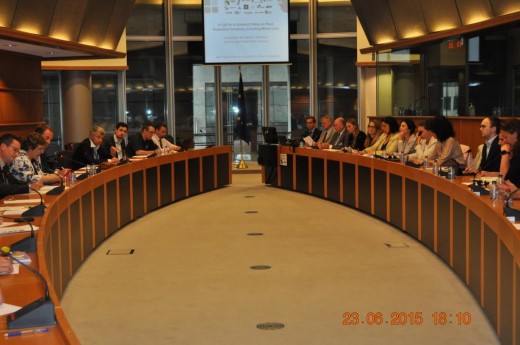19 agri-food chain organizations, associated in the AFCRT[1], and Anthea McIntyre, UK MEP, organized an event at the European Parliament. They “call for a coherent policy on plant protection solutions, including minor uses and speciality crops”
Read the presentation including:
– Agriculture production perspective, by Luc Peeters, Copa-Cogeca: need for a quick and concrete harmonization of the EU plant protection regulation.
– The need for processing factors (MRL for processed food), by Nathalie Lecoq, Fediol
– A trade perspective, by Katharina Keimelmayr, Coceral, and Egle Eimontaite, Freshfel. They underlined how the big confusion in the EU regulation, including for MRL, leads to a lack of confidence of supermarkets and blocking trade barriers.
– A PPP producer’s perspective, par Jean-Charles Bocquet, Ecpa. He showed how red tape and lenghty approval system are jeopardizing innovation. He called for “decisions based on risk assessment and an understanding of the impact”
The meeting had then an exchange of view with Wolfgang Reinert, DG Sante (European Commission) and a general discussion.
A call for a coherent European policy
During the meeting, AFCRT gave copies of a call which was published few months ago. Read here on ForumPhyto (in French).
Read the call in English
In this call, AFCRT gave some recommendations to the European Commission, including to:
– Ensure that the spirit of Regulation EC/1107/2009 is maintained through the placing on the market of sufficient (mechanical, biological and chemical) tools to protect crops.
– Ensure with Member States that one of the main objectives of Regulation EC/1107/2009 to harmonize usage authorisation is properly implemented without excessive additional national restrictions by individual Member States.
– Provide guidelines to foster harmonisation and mutual recognition by highlighting success stories in finding sustainable solutions.
– Provide appropriate criteria and guidelines to enable “low‐risk products” to be made available for use in a harmonised and timely way without further delay.
– Provide guidelines to make sure that the “comparative assessment” of products will be done in a harmonized and practical way, without distorting competition and trade.
– Urge Member States to pay particular attention to minor uses and take all the necessary steps to prevent ‘orphan crops’, where no suitable plant protection solutions are available.
Read the Press Realease of the EP Event. Nigel Thorgrimsson, AFRCT vice-chair summarized: “‘Solutions are urgently needed to ensure the competitiveness of the entire agri-food chain and the supply of high quality products for European consumers. A regulatory framework that allows for innovation is key in ensuring the availability of suitable plant protection solutions”
Our conclusion
1107/2009 EU regulation, in force since 2011, is a promise for a complete harmonization at EU level and for solutions for minor uses and speciality crops. In fact, red tape and lenghty procedures, Member States willings to deliver themselves authorisations, and anti-pesticides environmentalist pressures, are jeopardizing the process. This situation leads to regulatory dead-ends, especially for speciality crops, including fruit and vegetables, to heavy competition distorsions beween Member States, to conterproductive agronomic and environmental effects : for example about pest resistance management. It leads also to worsen the consumer health : expensive and less diversified fruit and vegs.
The Agri-Food Chain is now urging European and Member State authorities to ensure harmonisation, simplification, science based decisions for high quality agriculture products. This event is a step forward to a stronger and better dialog with the Commission and the European Parliament on this matter.

[1] Agri-Food Chain Round table
